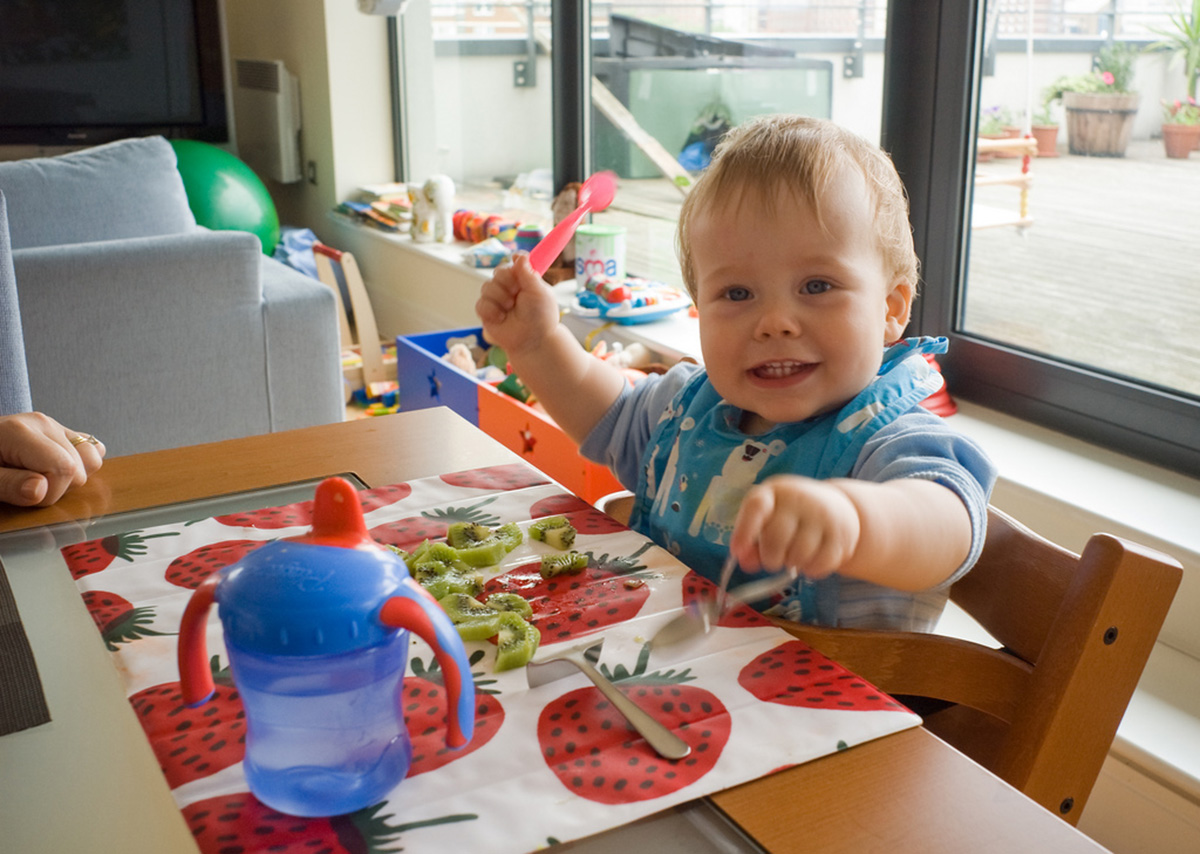Table of Contents
A baby-led introduction to solids offers a stress-free approach to getting babies used to non-milk foods — and one that's fun to the baby. What do you need to know about baby-led solids?
What!? Yes: Your Baby Is In Control (To An Extent)
Researcher Gill Rapley found that babies are, themselves, perfectly able to indicate when they are ready to begin eating solid foods, so long as they are offered the opportunity to do so — at their own pace. Rapley, like the WHO and the AAP, advocates breastfeeding exclusively for the first six months of a babies life, though formula-fed babies can definitely use her method too. She also recommends offering solids regularly after that time, and allowing babies themselves to explore those foods and decide when to eat them.
To people who are used to the idea that rice cereal is a baby's first solid food, that this is introduced at four months of age, and that all other subsequently introduced foods should be pureed — either by parents or a baby-food manufacturer — this idea seems like sheer madness.

Rapley disagrees. For her, the introduction of solids is a multisensory, positive, social, and an integral part of the rest of the baby's motor and cognitive development. People following her method (called Baby-Led Weaning in English but referred to as the "Rapley method" in some other languages) do not puree foods. They offer their babies a selection of the very foods they are themselves eating, presented in chunks.
The emphasis is on health foods, foods such as broccoli, avocado, banana, and carrots. Rapley's research suggests that babies who are offered finger foods will explore the textures and looks of those foods and then begin putting them in their mouths and eating them.
Can You Really Do This?
Yes. Absolutely. We did. My babies became, once ready for solids, fully-participating members of our mealtime rituals. I breastfed both until they were over two years old, but they gradually became used to solid foods by exploring and later eating whatever we were eating. The only thing I made absolutely sure to avoid was honey, due to the risk of botulism. I also took care not to offer nitrate-rich foods like spinach too often. We're a vegetarian family, so dilemmas about introducing meat never came up, and we also don't naturally eat a lot of dairy.
Today, my kids are healthy and strong elementary-aged kids. No, babies who are offered finger foods in chunks do not choke on their foods. Yes, it's entirely possible that they will only play with their foods rather than eating them. (That's OK; you're still breastfeeding them or using formula.) While it's absolutely true that babies who are exploring solids through baby-led weaning will make an emormous mess, at least you don't have food processors to wash up or baby-food jars to buy. Yes, they'll stil be making a mess when they are toddlers anyway. Finally, no, it isn't a fluke if they survive: remember, this is the way humans have introduced solid foods to babies pretty much forever, until that process was disprupted by modern life.
But Wait, What About The List Of 'Forbidden Foods'?
Don't you have to be fully aware of which foods to introduce when, because some foods are dangerous for young babies? Well, not exactly. As recently as 2008, the AAP had a complete list of "forbidden foods", suggesting in what sequence and at which age new foods should be introduced to young babies. The latest advice is a bit easier to understand.
A 2008 clinical report declared: "Although solid foods should not be introduced before 4 to 6 months of age, there is no current convincing evidence that delaying their introduction beyond this period has a significant protective effect on the development of atopic disease regardless of whether infants are fed cow milk protein formula or human milk. This includes delaying the introduction of foods that are considered to be highly allergic, such as fish, eggs, and foods containing peanut protein."
In addition, it stated: "In summary, the evidence [...] does not allow one to conclude that there is a strong relationship between the timing of the introduction of complementary foods and development of atopic disease. This raises serious questions about the benefit of delaying the introduction of solid foods that are thought to be highly allergic (cow milk, fish, eggs, and peanut-containing foods) beyond 4 to 6 months of age; additional studies are needed."
The read-more link directly above this paragraph offers more information on why exposing children to peanuts, a food that has an especially high allergy risk, early on can be beneficial. Parents who are worried, especially those who have allergies in their immediate families, should always consult their pediatricians before deciding which foods to offer when. It's always important to keep in mind that foods that are generally unhealthy, like processed foods and foods high in refined sugar, are also bad for babies. However, on the whole, a common-sense and no-stress approach will work great.
- Photo courtesy of jessicafm via Flickr: www.flickr.com/photos/jessicafm/572755154
- Photo courtesy of jessicafm via Flickr: www.flickr.com/photos/jessicafm/572755154
- Photo courtesy of Lars Plougmann via Flickr: www.flickr.com/photos/criminalintent/2542624200


Your thoughts on this